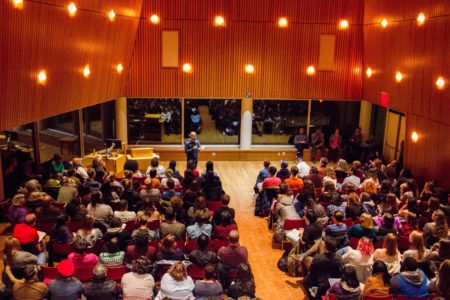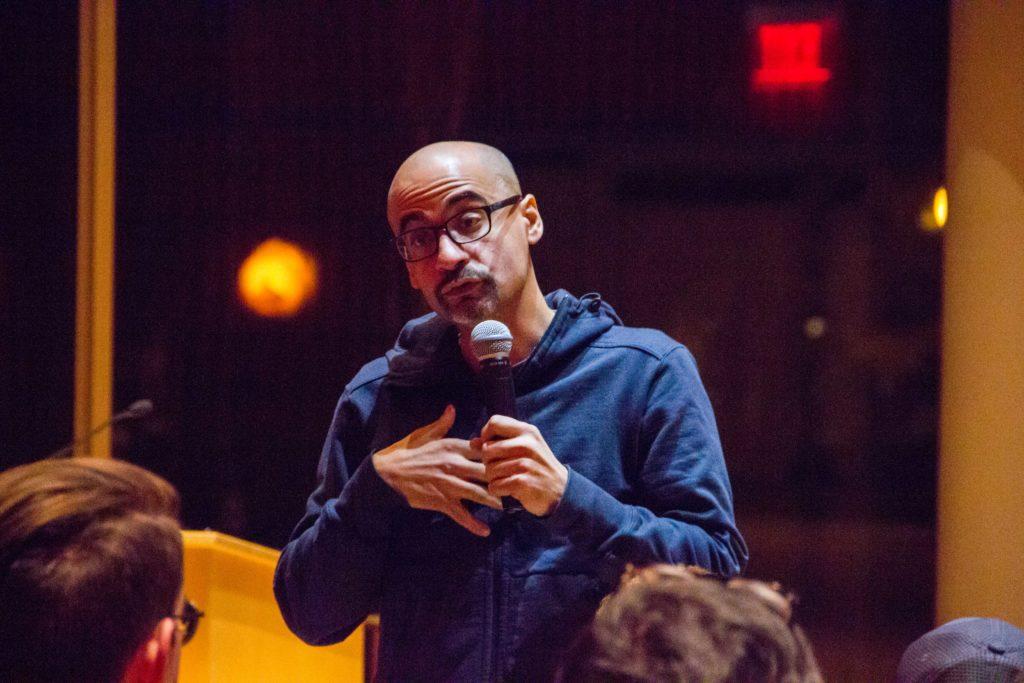By Mira Braneck & Louise Carhart
braneckm@grinnell.edu & carhartl17@grinnell.edu
Pulitzer Prize winner Junot Díaz visited Grinnell this past Monday, Feb. 13, leading several Q&A sessions with students, as well as a reading in JRC. Diverging from the usual Writers@Grinnell model, Diaz branched out from creative writing in his discussions to topics like resistance, diversity, civic duty and neoliberalism.
At the roundtable discussion, Díaz talked about the place of art in activism, civic action and how to resist in the current trying times.
“We’ll be fucked if all of y’all claim that whatever art you’re making is activism,” he said. “We live in a culture that ultimately – we can’t help it – we’re really self-serving. So if you’re an artist, you’re like, ‘how can my art do everything?’ … But the thing is art is just good for human beings. … There have always been artists involved in all sorts of movements. They’ve contributed their tremendous talents to movements. … My argument is the sensibility that one’s entire civic contribution is their art is … self-serving.”
“What is it about art that’s so special that you can’t say, ‘well, my job is my contribution.’ Why can’t the rest of us say that? Is it only because art is somehow fetishized in this extra dimensional nature? Why can’t I say well, the fact that I’m polite is my contribution – then I seem absurd. The line is, you know, thin.”
Díaz spoke of the importance of hands-on civic action as a form of resistance. He sees volunteering as one of the most effective ways to get through the disenfranchisement and hopelessness that many people feel, both on campus and in the country at large.
“Look: you can be as broke as you are, and you can have children, and you could be incredibly busy, but ultimately, all of us have to participate in the civic. … I think the idea is that civic labor is what we do above and beyond anything that can help us as human beings. … And I think that that’s really, really important. … The civic actually involves us disrupting our lives. It’s the nature of the civic.”
“There are a million ways for folks to figure out how to do their art, but I’m not trying to get at that, I’m not trying to argue that,” he said. “I’m trying to argue for a civic sensibility.”
This civic sensibility, for Díaz, means simply spending time helping others.
“It sounds completely anti-intuitive, but the best way to break out of this funk is to help other people. … Why is it important to help other people? Part of the reason we feel overwhelmed and negative … is because we have no context other than our fear and our pain,” he said.
“Our imagination shuts down, we only think in the simplest ways. … Fear shuts down cognitive function. I tell every one of my students to volunteer. … What happens when you begin to help other people is you discover that your pain is on a continuum. And what you become aware of is not your incapacity—what you become aware of when you help other people is vast privilege. And how much room for operation you got, how much room for generative action you have.”
“We ain’t fucking losing. We ain’t fucking undone. We ain’t fucking lost.”
One student, Luke Jarynza ’18, asked how Díaz felt about Chance the Rapper’s Grammy acceptance speech, in which he said, “I know that people think independence means you do it by yourself, but independence means freedom,” in terms of Díaz’s association with a university through his teaching position as a creative writer.
Díaz, rather than discussing his creative freedoms as a professor, turned to his and ultimately all of our place in neoliberalism.
“I don’t know anything about freedom,” he said. “We are all caught in this crazy ass oppressive nature. Some of us can accumulate the kind of privilege that permits us to duck, right, a lot of the real terrible ravages of this shit. But all of us are bounded and implicated.”
“Sort of like the Titanic—we’re all on the boat, and we’re all going down,” Díaz continued. “This whole system, we’re all enmeshed in it, no one is outside of the boat. Even people who ‘leave the system’ —that’s part of the system. That’s the nature of it. … I’ve never felt like there was anything that I could do that would make me less implicated in the exact system. Now there are ways that we can turn our privilege into good effects and ways that we can fight, which I think we all need to do.”
He did, however, have a moment to talk about Beyoncé and the racism implicit in the Grammys. “I’m still bugging out on Beyoncé. Explain that to me,” he said. “That’s what happens when you have a bunch of white voters, though. For real. I mean it’s a bugged out situation. And that’s what the weirdest thing is when you think about this … the majority of our cultural evaluation mechanisms, the people who run them are hostile to the primary cultural creators. So the Grammys is just like an anti-black, anti-Latino, anti-indigenous, anti-queer machine.”
Conversations from previous sessions continued later in the day, as students, faculty, members of the community and even out-of-state visitors packed into JRC 101 to Díaz read and answer questions from the audience. Díaz began as he had in earlier meetings, asking specifically for questions from women of color.
The discussion began as a safe space that Díaz had created and despite some pushback, JRC 101 was transformed into a place of honesty. Delving into topics such as the place of the N-word in literature and classrooms and the mental health situation in the United States, he advocated for self-care on the personal level. For Díaz, this self-care is integral to resistance to oppressive systems.
“If you’re like me, I grew up thinking … because I wasn’t white, I was the ugliest person in the world. Looking at my skin, looking at my hair, thinking about what I found desirable, it’s hard to remember this young person that had these toxic ideas … we’ve got to put love back into that system,” he said.
Speaking to a crowd reeling from the recent actions taken by the president’s administration, Díaz touched upon activism as crucial to the dismantling of current power structures. He advocated for finding antagonists and fighting to end their oppression.
This fervent adherence to a political life had a profound effect on the audience, as questions became more pointed and directed at his political beliefs. Díaz expressed himself and his opinions as an immigrant of color who had seen what life outside the United States was like and decided that he was in a unique place of privilege.
“There ain’t no money in this society that isn’t dripping in blood. The reason I say this is because it’s true. Now, this doesn’t alter the equation,” Díaz said. “The question is how many people is this an antagonistic contradiction. How many people are going to say ‘this battle of all the battles is a good one to fight’ and sure, I encourage that … It’s not like I don’t practice this, I believe in it.”





































































